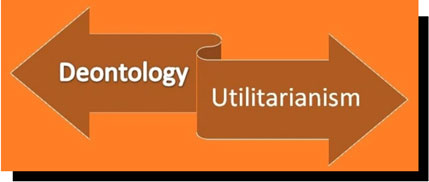Deontology
Deontology is an ethical theory that is most closely associated with the German philosopher Immanuel Kant who set forth positive and negative duties. Positive duties such as helping and rescuing others from harm or fulfilling one’s natural talents (duty to oneself). Negative duties include unethical behaviors like murdering, lying or exploiting others (treating others as a mean). Deontological theories, of any kind, are explicitly opposed to utilitarian theories which base morality on the calculation about the consequences of the action. Deontology does not justify itself by calculating consequences. That there is an innate moral base that transcends rational thought. Counter to Deontology Key Issues: How to choose which theory? Finding a theory of ethics is only one part of the problem. Another part of the problem of becoming good is the way we approach the choice and the way that determines our lives: the personal worldview. In the quest to resolve the denotological dilemma of attempting to satisfy notions of Kant's good will it serves to review the actions of the historical mythical character of Robin Hood. z
|
